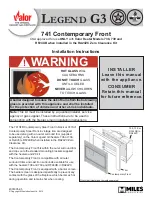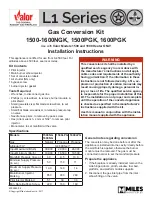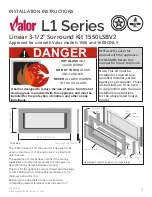
Model S4000CH
34
5.0 Troubleshooting
CAUTION:
Component level repair must be undertaken either by General Monitors’
personnel, or by competent authorized service engineers. SMT PCB repair shall
only be performed at a General Monitors facility. Failure to comply with this
requirement will invalidate the warranty.
Be sure to inhibit or disconnect external alarm wiring before making any check, which might
send the unit into alarm.
5.1 Fault Codes & Their Remedies
The S4000CH has self-diagnostics incorporated into the microprocessor’s program. If a fault is
detected, the output signal will drop to 0 mA, the fault relay will de-energize and a fault code will
be displayed. The output signal will inform a remote display module that the S4000CH is in the
Fault Mode. The display will indicate a fault code that can be viewed at the sensor site.
There are ten fault conditions that are monitored by the microprocessor, as follows:
5.1.1 F2 Failed to Complete Calibration
This fault will occur if the unit is placed in the calibration mode and no gas has been applied
within six minutes, or if gas has been left on for more than six minutes.
ACTION
– Remove gas, if present. Apply the magnet to the GM logo on the cover to clear
the fault. Attempt to calibrate.
5.1.2 F3 Flash Checksum Error
This fault indicates that the contents of the S4000CH’s program memory have changed.
This usually occurs when powering the unit up after a lightning strike or large voltage
transient on the power or signal lines to the unit.
ACTION
- The unit must be returned to the factory or authorized service center for repair.
5.1.3 F4
Sensor
Error
This fault indicates that either one of the remote sensor leads is open or shorted, or that the
sensor has drifted greater than –10%. The S4000CH has an additional protection feature. If
any of the sensor wires are shorted to ground, the sensor power will be turned off. After 1
minute the power will be turned back on. If the short is still present, power will quickly be
turned off.
ACTION
- Check the integrity of all sensor connections, and ensure that the cable from the
S4000CH to the remote sensor is not damaged. If all sensor leads are connected properly,
attempt to re-calibrate the unit. If calibration fails, replace the sensor and re-calibrate.
NOTE:
Anytime a sensor is replaced, the unit should be disconnected from all alarms, as
the unit may go upscale upon power-up.
















































